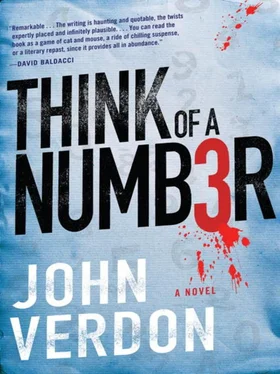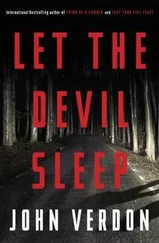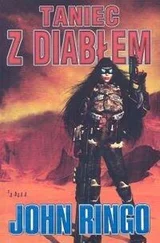Madeleine answered on the second ring with that optimistic, welcoming voice phone calls always elicited from her.
“It’s me,” he said, his own voice reflecting only a fraction of the light in hers.
There was a one-beat pause. “Where are you?”
“That’s what I’m calling to tell you. I’m in Connecticut, near a town called Wycherly.”
The obvious question would have been, “Why?” But Madeleine didn’t ask obvious questions. She waited.
“There’s been a development in the case,” he said. “Things may be coming to a head.”
“I see.”
He heard a slow, controlled breath.
“Are you going to tell me anything more than that?” she asked.
He gazed out the car window at the lifeless vegetable stand. More than closed for the season, it looked abandoned. “The man we’re after is getting reckless,” he said. “There may be an opportunity to stop him.”
“The man we’re after?” Now her voice was thin ice, fissuring.
He said nothing, jarred by her response.
She went on, openly angry. “Don’t you mean the bloody murderer, the serial killer, the man who never misses-who shoots people in their neck arteries and cuts their throats? Isn’t that who you’re talking about?”
“That’s… the man we’re after, yes.”
“There aren’t enough cops in Connecticut to handle this?”
“He seems to be focused on me.”
“What?”
“He seems to have identified me as someone working on the case, and he may try to do something stupid-which will give us the opportunity we need. It’s our chance to take the fight to him rather than just mopping up one murder after another.”
“What?” This time the word was less a question than a pained exclamation.
“It’s going to be all right,” he said unconvincingly. “He’s starting to fall apart. He’s going to self-destruct. We just have to be there when it happens.”
“When it was your job, you had to be there. You don’t have to be there now.”
“Madeleine, for Chrissake, I’m a cop!” The words exploded from him like an obstructed object blown loose. “Why the hell can’t you understand that?”
“No, David,” she responded evenly. “You were a cop. You’re not a cop now. You don’t have to be there.”
“I’m already here.” In the ensuing silence, his temper subsided like a retreating wave. “It’s all right. I know what I’m doing. Nothing bad is going to happen.”
“David, what is the matter with you? Do you just keep running at the bullets? Running at the bullets? Until one goes through your head? Is that it? Is that the pathetic plan for the rest of our lives together? I just wait, and wait, and wait for you to get killed?” Her voice cracked with such raw emotion on the word killed that he found himself speechless.
It was Madeleine who eventually spoke-so softly he could just make out the words. “What is this really about?”
“What’s it about?” The question hit him from an odd angle. He felt off balance. “I don’t understand the question.”
Her intense silence from a hundred miles away seemed to surround him, press in against him.
“What do you mean?” he asked. He could feel his heart rate rising.
He thought he heard her swallow. He sensed, somehow knew , she was trying to make a decision. When she did answer him, it was with another question, again spoken so softly he barely heard it.
“Is this about Danny?”
He could feel the pounding of his heart in his neck, his head, his hands.
“What? What would it have to do with Danny?” He didn’t want an answer, not now, not when he had so much to do.
“Oh, David,” she said. He could picture her, shaking her head sadly, determined to pursue this most difficult of all subjects. Once Madeleine opened a door, she invariably walked through it.
She took a shaky breath and pressed on. “Before Danny was killed, your job was the biggest part of your life. Afterward, it was the only part. The only part. You’ve done nothing but work for the past fifteen years. Sometimes I feel like you’re trying to make up for something, forget something… solve something.” Her strained inflection made the word sound like the symptom of a disease.
He tried to maintain his footing by holding on to the facts at hand. “I’m going to Wycherly to help capture the man who killed Mark Mellery.” He heard his voice as if it belonged to someone else-someone old, frightened, rigid-someone trying to sound reasonable.
She ignored what he said, following her own train of thought. “I hoped if we opened the box, looked at his little drawings… we could say good-bye to him together. But you don’t say good-bye, do you? You never say good-bye to anything.”
“I don’t know what you’re talking about,” he protested. But that wasn’t true. When they’d been about to move from the city up to Walnut Crossing, Madeleine had spent hours saying good-bye. Not only to neighbors but to the place itself, things they were leaving behind, houseplants. It had gotten under his skin. He’d complained about her sentimentality, said talking to inanimate objects was weird, a waste of time, a distraction, that it was only making their departure more difficult. But it was more than that. Her behavior was touching something in him that he didn’t want touched-and now she’d put her finger on it again-the part of him that never wanted to say good-bye, that couldn’t face separation.
“You stuff things out of sight,” she was saying. “But they’re not gone, you haven’t really let go of them. You have to look at them to let go of them. You have to look at Danny’s life to let go of it. But you obviously don’t want to do that. You just want to… what, David? What? Die?” There was a long silence.
“You want to die,” she said. “That’s really it, isn’t it?”
He experienced the kind of emptiness he imagined existed at the eye of a hurricane-an emotion that felt like a vacuum.
“I have a job to do.” It was a banal thing to say, stupid, really. He didn’t know why he bothered to say it.
There was a lengthy silence.
“No,” she said softly, swallowing again. “You don’t have to keep doing this.” Then, barely audibly, despairingly, she added, “Or maybe you do. Maybe I was just hoping.”
He was at a loss for words, a loss for thoughts.
He sat for a long while, his mouth slightly open, breathing rapid, shallow breaths. At some point-he wasn’t sure when-the phone connection was broken. He waited in a kind of vacant chaos for a calming thought, an actionable thought.
What came instead was a sense of absurdity and pathos-the thought that even at the moment when he and Madeleine were emotionally stripped, raw and terrified, they were literally a hundred miles apart, in different states, exposing themselves to empty space, to cell phones.
What also came to mind was what he’d failed to speak about, had failed to reveal to her. He hadn’t said a single word about his postmark stupidity, how it might point the killer to where they lived, how the oversight arose from his own obsessive focus on the investigation. With that thought came a sickening echo, the realization that his similar preoccupation with an investigation fifteen years earlier had been a factor in Danny’s death-maybe the ultimate cause of it. It was remarkable that Madeleine had connected that death with his current obsession. Remarkable and, he had to admit, unnervingly acute.
He felt he had to call her back, admit his mistake-the peril he’d created-warn her. He dialed their number, waited for the welcoming voice. The phone rang, rang, rang, rang. Then the voice he heard was his own recorded message-a little stiff, almost stern, hardly welcoming-then the beep.
Читать дальше












